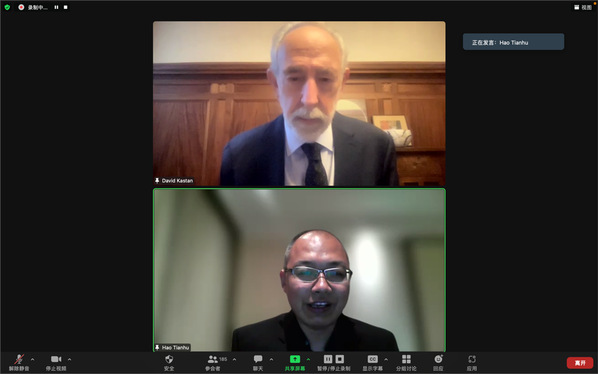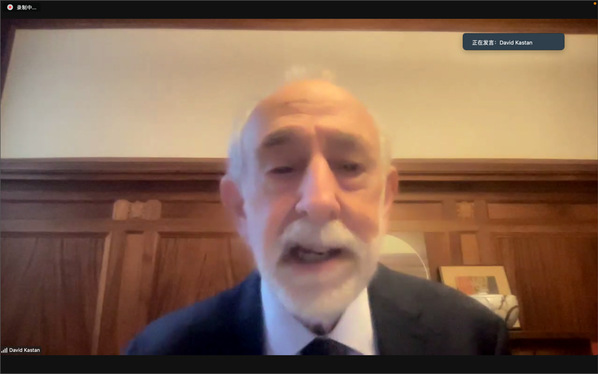The 36th session of lectures held by CMRS (Center for Medieval and Renaissance Studies, School of International Studies, Zhejiang University) took place on the evening of November 4, when Prof. David Kastan from Yale University lectured on “The politics, piety, and poetics in Milton’s Paradise Lost”. The lecture lasted for more than two hours, and appealed to over 260 students and teachers from the institutions of higher learning across the world. As the opening lecture “Texts, approaches, directions: international symposium on poetry studies”, it was hosted by Prof. HAO Tianhu, Qiushi Distinguished Scholar and Director of CMRS, and sponsored by “ZJU-Yale Medieval and Renaissance Research Program”, a cooperative program between the two world-class universities.
Prof. David Kastan has lectured at Dartmouth College and Columbia University before joining Yale University, and has been a distinguished visiting professor at University of Copenhagen (Denmark), Eötvös Loránd University (Hungary), and the American University in Cairo (Egypt). As the international consultant-in-chief of CMRS, Prof. Kastan is globally acknowledged for his eruditeness in Shakespearean studies and bibliography. His works have been translated into a variety of languages such as Chinese, Russian, Danish, Hungarian, Italian and Spanish. He was one of the general editors of Arden Shakespeare (III), and the editor of The Oxford Encyclopedia of British Literature (5 volumes in total). Among his scholarly publications are Shakespeare and the Shapes of Time, Shakespeare after Theory, Shakespeare and the Book and A Will to Believe: Shakespeare and Religion. His latest works include On Color (published by Yale University Press in 2018, and translated into Chinese and published by Peking University Press in 2020), and a book on Shakespeare and Rembrandt (to be published by Princeton University Press). The Chinese translated version of Shakespeare after Theory has been published by Zhejiang University Press to constitute the Translation Series of Medieval and Renaissance Studies edited-in-chief by Prof. HAO Tianhu.

Prof. HAO Tianhu hosting the lecture
Prof. Kastan started his lecture with Milton’s God (1961) by Prof. William Empson and Milton Unbound (1996) by Prof. John Rumrich, two of the most significant monographs that review Milton’s Paradise Lost in English. Since both authors have once taught in China—Prof. Empson at Peking University in the 1930s and from 1947 to 1952, and Prof. Rumrich at Peking University from 1986 to 1987 and currently at CMRS—Prof. Kastan saw an important bond between China and their works, in which Paradise Lost was saved by Prof. Empson from the presumption of piety and mystery, and by Prof. Rumrich from Stanley Fish. Their teaching experience in China has influenced their point of view on Milton. In the meantime, Prof. Kastan expressed appreciation for Prof. HAO’s continued efforts in studying the reception history of “Milton in China”.

Prof. Kastan lecturing on Milton’s Paradise Lost
According to Prof. Kastan, scholars in the US and the UK are mainly concerned with the interrelations and contradictions among the politics, piety, and poetics in Paradise Lost. Prof. Kastan holds that the epic is rooted in the theological and political debate in Britain of Milton’s time. There is no contradiction between Milton’s contention for a political revolution to overturn the monarchy in Britain, and Satan and the Fallen Angel’s speech intended to overrule the God. Instead, those two expressions are artistically combined to underpin Milton’s rejection of the absolutism of Stuart dynasty rather than the God. A major difference between the two kinds of absolutism lies in that the God creates all with His infinite and certain power, while the Stuart kings mystify, bend, and abuse mortal power on the basis of the self-proclaimed divine right.
Prof. Kastan believes that Milton’s political stance and religious piety are predetermined by his identity as a poet. As a reimagination and rewriting of Genesis of the Old Testament, Paradise Lost offers the background and continuation of the story, as well as creative interactions and dialogues. Presenting charactered supernatural beings, the God, and the Christ, the epic amounts to a comprehensive history of the universe. Moreover, Milton rejects conventional epics, and relates the knights and wars in the poem to the royalists of his time. As a protestant, Milton views epics not only as a form, but also a religious reception. However, Paradise Lost doesn’t intend to support theodicy, and Milton refuses to stand with either the God or the Devil. It seems that everything Milton does to the Bible and the epic is to the purpose of his own poetics of reimagination and rewriting. Such a poetic stance attacks metaphysics by directing the reader to leave the mystery of the God for the creativity of the humanity. At the end of his lecture, Prof. Kastan encouraged everyone to read the great epic of Paradise Lost.
In the Q&A section, Prof. Kastan resorted to his eruditeness by giving professional and creative answers to questions, such as “what is the origin of the evil”, “what is the symbolic meaning of purple in Paradise Lost written in the 17th century”, “what are the similarity and difference between Milton and Virgil in terms of poetics, piety, and politics”, “what contribution does Milton make to epics”, and “what kind of modernity lies in Milton’s works”.
Questions about Milton were also raised by Prof. Kastan during his lecture. How is Milton read and taught in the English world, in China, and in other regions of the world remains a valuable question for each and every one of Milton scholars and even literary scholars. According to Prof. Kastan, Prof. Empson and Prof. Rumrich set an example of teaching Paradise Lost, a highly political and religious poem, to readers indifferent to Britain in the late 17th century, by discovering the poetics, politics, and piety from within the poem. Though the lecture centered on Milton’s Paradise Lost, scholars from all literary fields were able to draw on Prof. Kastan’s experience of literary studies.

A group picture of some attendees
Text: TANG Jie
Photos: ZHANG Lian, SHAO Huiting
Center for Medieval and Renaissance Studies, School of International Studies
Translated by CAI Zhengwu
Proofread by XU Xueying



